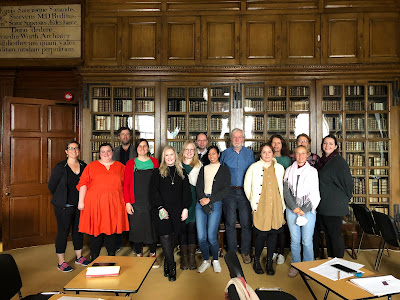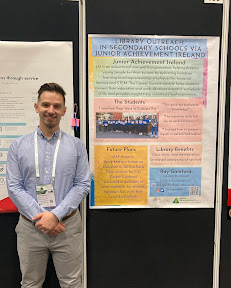 |
| Image courtesy of Author |
It is with thanks to a bursary from the Acquisitions Group of Ireland (AGI) that I was afforded the opportunity to attend the IFLA World Library and Information Congress, the most global professional and trade event for the library and information sector. This was the 87th Congress but only the first time it was held in Ireland. With over 2,000 delegates the event had high-level speakers, experts in the profession, and library and information people from around the world exploring issues and developments of interest to the global library field. The event was a time to celebrate library advocacy successes, learn lessons from each other, and strengthen the voice of the library profession. I heard from lots of people I would not have had the chance to hear or learn from before, met up with many familiar faces not seen since before COVID, and got many ideas to follow up on. It was a great day out!
The event took place over several full days in July 2022. There were so many sessions scheduled (over 50) that an iPlanner app was available to help delegates plan and coordinate their personal timetable. Although I only attended for one day, having the planner let me see which sessions were scheduled and when so I could choose the sessions that were of most interest to me before the event as it’s impossible to attend all the programmed sessions! The bursary covered one day’s registration fee for the event, one of the downfalls of the event is the cost. However, to enable as much participation as possible, eight key sessions were made available online for free. This meant that I (and anyone) could look over the wonderful opening and closing ceremonies even though I was not in attendance on the days they took place, as well as watching other key sessions on demand.
 |
| Image courtesy of Author |
As well as the huge number of programmed sessions there were over 170 poster presentations. The cat poster asking, “Are librarians cat people?” was the most talked about poster of the event. The winning poster was the Gazi Husrev-beg Library Book Museum which showcased their Library and its nearly half-millennium-long journey.
The Library Boulevard was an opportunity to discover Irish libraries. Featuring a variety of promotional pop-ups on a range of different topics, such as new projects in libraries on digital innovation, distinctive architecture, and new library services. It was fantastic to see the array of work being done in libraries across Ireland. The boulevard was great to wander around when moving between sessions or grabbing a quick cup of coffee.
 |
| Image courtesy of Author |
Here I will discuss some of the sessions I attended and enjoyed.
The State of Outcome/Impact Measurement in Metropolitan, National, and Academic Libraries (Session 097).
The IFLA Metropolitan Libraries Section and Statistics and Evaluation Section presented information on diverse approaches to outcomes and impact measurement at their libraries. Focusing on how libraries move from outcome measurement to the assessment of the impact or value of library programs and services.
Telling the Next Chapter: Marketing Libraries of the Future (Session 109).
This session presented a keynote by Waterford City & County Libraries Executive Librarian Tracy McEneaney on marketing of Irish libraries. Tracy spoke about the ‘Squeeze in a Read’ campaign by encouraging everyone to read. She believes that we need to put more money into marketing our libraries and thinks library staff are our best assets, and I would have to agree!
The keynote was followed by the top 3 winners of the 2022 IFLA PressReader International Marketing Award. First place and worthy winners were Yarra Libraries in Australia with We’re ready for the next chapter. Help us write it, this marketing campaign was a mix of digital and print, non-traditional outreach as well as effective user participation. The screenshot shows some of their catchy marketing material.
The Use of Transformative Agreements: Do They Increase Access to Research? (Session 121).
This session started with the statement that the only constant is change and asked what can we do to manage change. Libraries have always evolved with time, as the image below shows.
 |
| Image courtesy of Author |
With the growing appreciation and support for Open Access there has been a growth in the use and development of transformative agreements. These transformative agreements allow for libraries and other such institutions and organizations to shift subscription costs to open access publishing. Due to efforts by funders, governments and libraries, these types of agreements and this reallocation of funding has grown notably in recent years. The panelists concluded that transformative agreements are not a perfect solution, but by developing existing models, sharing risk, and establishing clear communication, libraries can move open access forward.
I attended other sessions, but the sessions highlighted here gave me the most inspiration and ideas to follow up on.
Now it wasn’t all about attending sessions by experts, there were also wellbeing activities, including guided walks and library visits, but as I was only there for the day these were unworkable for me. What I did enjoy though was meeting two lovely Irish guide dogs who were there as part of the conference wellbeing activities.
The most valuable gain from attending this event was the personal connections with other delegates. I enjoyed my conference experience; even though, the venue and crowds were a bit overwhelming! I did not realize how big the Convention Centre is and how packed the venue, particularly the poster area would be. Nevertheless, it made for a great opportunity to bump into delegates, sometimes literally, making new connections and re-establishing ties with familiar faces. I was sorry to have missed out on the cultural evening at the Lexicon in Dún Laoghaire which was held on the evening I attended the conference as it would have been a good chance to meet people from around the world in a more relaxed environment, but I had to get the bus back to Galway!
The day was packed full of lively discussion from both experts in the field that were presenting and the delegates I met in the venue areas. The diversity of our profession was truly reflected in the conference, I heard stories of libraries and librarians from all over the world and found the conference experience extremely engaging and inspiring. My tip for anyone who wishes to attend the event is to try not to get overwhelmed by the massive size of the conference, plan ahead and embrace it! Try and attend for the duration of the conference so you can fully immerse yourself in the conference experience, attend more sessions to learn and get more of a chance to engage and connect to widen your profession network.
To conclude, register to become a volunteer, this means that if accepted you will get to attend the event for free. The application for volunteers has just opened for the 88th World Library and Information Conference in the Netherlands in August 2023, if anyone is tempted apply now! Thanks again to the AGI for the opportunity to attend this huge event.
References.
Conference website: https://2022.ifla.org/
WLIC 2022 online sessions and recordings: https://www.youtube.com/playlist?list=PLV81siTMahbuJpAjacTKcbgrq0KClBswM
Winning poster: Ejla and Adnan Ćurovac, Bosnia and Herzegovina: Gazi Husrev-beg Library Book Museum
The International Federation of Library Associations and Institutions (IFLA)’s albums – Flickr
2023 Conference website: https://2023.ifla.org/




%20(1).jpg)
.jpg)













